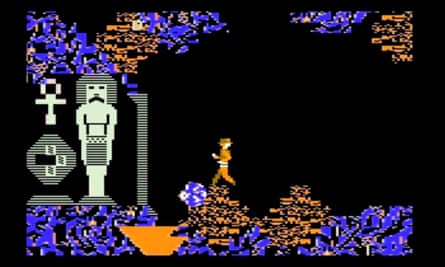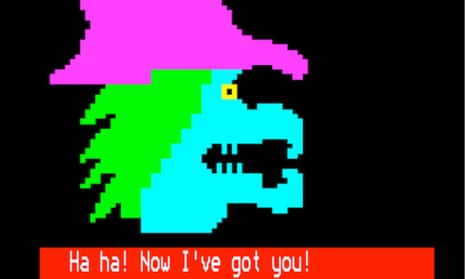It was Caverns of Khafka for me. Discovered one rainy afternoon in a Debenhams bargain bin, this weird Commodore 64 dungeon exploration game totally freaked me out with its funeral dirge soundtrack and horrific screeching bats. When I tried to tell my friends about it, they looked confused and concerned – no one else had ever heard of it. I started to think I was the only person in the world who had explored this disorientating adventure – it took on a sinister air.
In the pre-internet era of gaming, it was common to stumble upon these hidden oddities. The industry was more disorganised with smaller publishers distributing games that were often programmed by eccentric loners, and there was only a handful of specialist magazines to call them out. Games were snuck onto the shelves of newsagents and video rental shops, or into car boot sales and computer fairs, and you often had no idea what they were until you bought them and loaded them up. And by then it was far too late.

I’ve only met a few people who played the 1983 BBC Micro game Granny’s Garden, but none of them can forget it. It was billed as an educational puzzle adventure, but every time you messed up, a hideous blocky image of a witch appeared on screen like some sort of demonic Ceefax page, accompanied by the message “Ha ha! Now I’ve got you!” Young victims of this terrifying game usually suffered alone because no one else in their school could afford a BBC Micro.
When I asked on Twitter if anyone else could remember being psychologically scarred by some awful obscure game that no one else had ever seen, I was inundated with responses. The author Julie Mayhew recalled the creepy prison game Stir Crazy, in which you played an incarcerated skinhead peeling potatoes to unsettlingly jaunty music. Game designer Alex Darby dredged up the memory of uncanny Commodore 64 adventure Avalon, and its sequel Dragontorc. “They scared the crap out of me, to the extent I had to stop playing them,” he admits. Another game designer, Rhodri Broadbent, introduced us to the BBC Micro game Boffin, in which players were terrorised by a giant spider, which stood stock-still until the player strayed too close. “The scariest stage of any video game I’ve played,” he wrote. “And the sound... THE SOUND when it starts to move.”
The scariest stage of any video game I've played, and the sound... THE SOUND when it starts to move. pic.twitter.com/d57R7eCr81
— Rhodri (@sdrhod) September 3, 2019
Other examples of cursed games from the 1980s include Mad Nurse, where you had to look after some babies in a hospital, but if you left them alone too long they’d stick their fingers in plug sockets and get electrocuted. Then there was the ZX Spectrum game Streaker, which featured a mugging victim running around an alien city, naked, looking for his clothes. “A mechanic who worked at my dad’s garage gave it to me on a blank white cassette tape,” Twitter user @maxscottslade told me, further adding to the seedy vibe.

These experiences weren’t restricted to the 8-bit era. Twitter user @odeanna recalled an Atari ST game she found on a magazine demo disc: “It was some kind of flying game. I’d played it loads of times and then one time I lost all control and the plane landed itself. A tiny pixelated man climbed out and had a wee. Never quite got over that.” The Amiga game Weird Dreams was a literal nightmare simulator in which the player was trapped in the unconscious mind of a dying patient. “That was a trip for my nine-year-old brain,” says Xbox social marketing manager, Graeme Boyd.
The original PlayStation was inundated with weird, traumatising games because the console was so successful, game development was still relatively inexpensive and European publishers were enthusiastically importing Japanese titles by the skip-load, with questionable quality control. There was the deeply unsettling gothic adventure Koudelka, a nightmarish tale of priests and psychics, set in… Aberystwyth. Journalist and author Simon Parkin also recalls The Book of Watermarks, an eerie Shakespeare-inspired adventure made all the more horrifying by the fact that its soundtrack was inspired by Enya. “I’ve never met anyone else who played it, but it stayed with me for years,” he says, before quickly adding, “It definitely existed,” as though attempting to convince himself rather than me. The FMV-led horror game Dark Tales: From the Lost Soul was so terrifying and so obscure, it has almost taken on the feel of the videotape in the Ring movies.

Indeed, there are some games that have become legendary for their unsettling effects, even though they may never have existed at all. A trippy and disorientating 1981 arcade title, Polybius, was rumoured to be a psychological experiment run by the US government and has since been dismissed by many as an urban legend. In the 90s, the internet became obsessed with the little seen game Killswitch, apparently created by an Eastern European developer named Karvina Corporation. The creepy adventure featured a woman trapped in a mine full of demons – and according to legend, the game code would self-delete when the player died. Now accepted as a community-generated online myth, the game nevertheless fascinated and terrified young net users who often encountered Killswitch stories and speculation while browsing anonymous message boards and forums late at night.
Nowadays, of course, we’re inundated with games that no one has heard of – Smartphone app stores and online PC game services such as Steam are flooded with hundreds of new titles every week. We’re wise to them. But those days of bargain buckets at the back of the local computer shops or newsagents, all filled with strange, idiosyncratic carts, discs and cassettes were a rite of passage for gamers and the games industry itself. Caverns of Khafka freaked me the hell out with its cacophonous sound effects and dark, weird, haunted tunnels, yet it also stayed with me, like a strange old film discovered at the back of the video rental store. It was mine, it was my secret, and the shivers it gave me were all the more exquisite because of it.

Comments (…)
Sign in or create your Guardian account to join the discussion